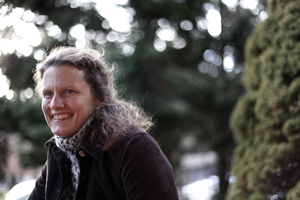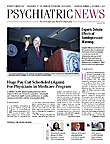A home-visiting program for teenage American-Indian mothers not only reduced maternal risks and improved behavioral outcomes for them and their children, but also helped the high-school-educated workers who carried out the intervention.
Home visits have been used in other contexts for decades, but they usually employed nurses.
“This is the first time an evidence-based home-visit program using paraprofessionals has been tested in an American-Indian community,” said lead researcher Allison Barlow, Ph.D., M.P.H., associate director of the Johns Hopkins Center for Indian Health.
The paraprofessionals—called family health educators—were young women recruited from the Apache and Navajo reservations in Arizona, the same ones as the teen mothers. Many of them had also given birth for the first time when they were young and so had a special insight into the lives of their subjects.
“These women had a passion for their community and were bilingual in English and Apache or Navajo, which is important since older people in multigenerational families often only spoke their native languages,” said Barlow in an interview with Psychiatric News.
Teen pregnancy is a complex issue in this population, said Barlow. About 46 percent of mothers covered by the Indian Health Service began bearing children in their teen years.
The culture values childbearing and provides some support for the young mothers, but many face familiar risk factors.
“American Indian adolescents . . . have the highest rates of teen pregnancy, substance use, suicide, and dropping out of school of any racial or ethnic group in the country,” said Barlow and colleagues online October 10 in AJP in Advance. Their lives are often unsettled during and after pregnancy. On average, they moved at least twice a year.
In the study, 322 patients completed baseline assessments and were randomly assigned to the intervention or to an active control arm. Both cohorts received “optimized standard care,” including transportation to clinic visits, information on care, and referrals to local services.
The active group also received the Family Spirit intervention from health workers trained by Johns Hopkins. The program included training the young mothers in observing their babies, interpreting their cries correctly, reading to them, and, after their first birthday, developing routines and avoiding power struggles.
The paraprofessionals also worked with the mothers to develop important life skills such as budgeting, nutrition, conflict management, and partner communication, said Barlow.
Home visits began during pregnancy and continued until the child was 36 months old. Two-thirds of the mothers stayed with the program for the full three years.
Those in the intervention group demonstrated more parenting knowledge and parental locus of control and less substance use, although no differences in parental stress were seen. They had significantly lower scores on tests of depression and externalizing problems.
The children in the intervention arm scored lower on measures of externalizing and internalizing problems and dysregulation from 12 months to 36 months.
The program was designed in partnership with the American-Indian community, and it had at least one additional benefit for that community, said Barlow. “We were pleased to see the program’s ability to build up the local workforce,” she said. “After they were trained by Hopkins, not one is unemployed. They are either in school or working in health-related jobs.”
The study has added significance today, given the dearth of research on home-visiting programs in low-resource populations, said Barlow. The Affordable Care Act (ACA) mandated $1.5 billion for the Maternal, Infant, and Early Childhood Home Visiting Program, with 3 percent set aside for tribal communities. The Family Spirit program is now included in the Substance Abuse and Mental Health Services Administration’s National Registry of Evidence-based Programs and Practices, making it eligible for funding under the ACA. ■
“Paraprofessional-Delivered Home-Visiting Intervention for American Indian Teen Mothers and Children: 3-Year Outcomes From a Randomized Controlled Trial” can be accessed
here. Information about the Johns Hopkins Center for American Indian Health is available
here.

